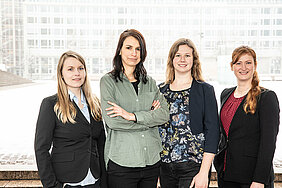A team of researchers with complementary expertise from the Department of Biocompatible and Bioactive Surfaces at the Leibniz Institute for Surface Engineering (IOM) has set itself the goal of establishing innovative TiO2 nanotube scaffolds as an economical product on the tissue culture platform market. Under the direction of Prof. Dr. Stefan G. Mayr, the focus is on the development of an alternative product for long-term cultivation of various adult tissues. A corresponding project has now been approved within the framework of the "Validation Funding" program of the Sächsische Aufbaubank (SAB) and the European Regional Development Fund. This funding will be used to bring the scaffolds to market maturity in the coming months.
The structure and function of a fully grown tissue can so far only be preserved with great difficulty outside the body. On conventional filter inserts, sensitive tissues usually die after a few hours or days, cells migrate out of the tissue association and the tissue literally disintegrates. Sophisticated scaffold structures, so-called scaffolds made of titanium dioxide, are intended to solve this problem: the tissue can adhere extraordinarily well to millions of tubes arranged next to each other in the nanometer range. It is permanently supplied with a nutrient medium and can thus be kept alive for many days up to several weeks and months if the diameters of the nanotubes are correctly adjusted. Compared to conventional methods, this innovative cultivation principle also offers an environmentally conscious, resource-saving and cost-effective alternative.
"In the coming months, we will be looking for a few needles in a haystack - in our case, the perfect surface properties for specific tissue types. This is exactly what makes our work so exciting: by cultivating tissues, we can investigate, among other things, a targeted dosage of drugs, and we can do this without any animal testing at all" explains Sabrina Friebe, scientific researcher and PhD student at the IOM, who has been investigating the long-term cultivation of adult retinal tissue on TiO2 nanotube scaffolds for more than 5 years.


